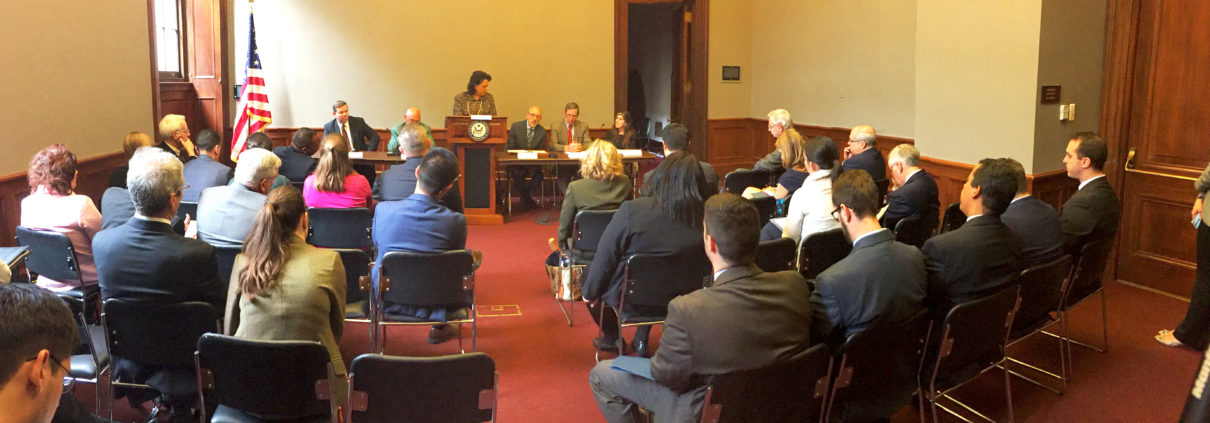Senate Staff Attend US Family Health Plan Showcase on Capitol Hill
United States Senate staff had an opportunity to learn first-hand about the best in care, quality and patient satisfaction for military families and veterans last week at a briefing on the US Family Health Plan.
To view highlights from the USFHP Senate briefing, click here.
Part of the Military Health System since 1981, the US Family Health Plan provides the TRICARE Prime benefit through six non-profit regional health care provider organizations that serve military families and veterans with quality coordinated care and best-in-class patient satisfaction. The briefing was hosted by Senators Susan Collins (R-Maine) and Barbara Mikulski (D-Maryland), who represent states in which US Family Health Plan member providers Martin’s Point HealthCare and Johns Hopkins Health Care operate.

US Family Health Plan executives and beneficiaries speak to Senate staff on Thursday, March 17, in the Russell Senate Office Building. At left, retired Chief Master Sergeant Michael Tedford offers personal anecdotes about the care he has received through a US Family Health Plan provider after a 30-year career in the U.S. Air Force.
“The US Family Health Plan is an amazing health plan,” said Linda Marzano, chair of the US Family Health Plan Alliance’s board of directors and CEO of Seattle-based Pacific Medical Centers. “We offer high-quality care and high patient satisfaction for all of our beneficiaries. Our vision is to really simplify healthcare for everyone.”
“Serving the families that have served our country is our highest priority,” added Jeff Bloom, senior vice president at St. Vincent’s Catholic Medical Centers of New York. “We believe establishing a strong culture of compassion improves quality of care, and we take pride in delivering exceptional healthcare benefits to all our members.”
Unique among TRICARE programs, the US Family Health Plan provider organizations serve more than 145,000 beneficiaries through fixed price contracts and using a capitated care model. David Chicoine, senior Vice President and plan CEO for Brighton Marine Health Center, the US Family Health Plan provider in Massachusetts and Rhode Island, explained how care capitation allows for greater focus on disease prevention, wellness programs and improved care access for beneficiaries.
“The US Family Health Plan is the only fully at-risk managed care plan that the Department of Defense offers,” he said. “What that means is the government pays the programs a fixed annual premium for each member who enrolls in the health plan. Transferring the risk to deliver all of the healthcare to us compels us to create an environment in which patient engagement and effective access to care is optimized. We are responsible for providing all of their care, regardless of what they need.”

Retired Col. William E. Hall, USAF (center), speaks with an aide to Sen. Sherrod Brown (D-Ohio), following the US Family Health Plan briefing on March 17. Col. Hall is a US Family Health Plan beneficiary of Martin’s Point Health Care in Maine.
Staffers representing 16 different U.S. Senate offices heard compelling testimony from service members who have entrusted the US Family Health Plan with their health care. Retired U.S. Air Force chief master sergeants Michael Tedford, a Johns Hopkins beneficiary, and Charles Halsted, a Martin’s Point beneficiary, shared examples of their families’ positive experiences with the US Family Health Plan.
“One of the big focuses on care mimics the old cliché – an ounce of prevention is worth a pound of cure. That approach seems inculcated into the culture of the plan,” said Tedford, who retired after a 30-year career that included stints on the aircrew of Air Force One. “Over the years, I’ve been able to share my experiences with a bunch of fellow military retirees, and a lot of them have signed up for the [US Family Health Plan] and have had pretty much the same positive experiences that I’ve had.”
Chief Halsted offered a deeply personal story about the quality care his wife received.
“My beautiful wife is a constant gardener,” Halsted said. “She’s highly susceptible to skin cancer, and like me she wears heavy glasses. In the last two years, she’s had a problem with one eye, which required cataract surgery, and in this last year, she had a case of skin cancer near the eye. Martin’s Point jumped right into it, arranged for all the tests, surgeries and post-op work that had to be done. I don’t know what more you can ask from a care provider. It means that I can be assured of her care and my care through my extended life, and I plan to push it hard. It means that I have people I can go to, and I’ll tell you how important that is.”
Mary Cooke, Vice President of the Johns Hopkins US Family Health Plan program, discussed how the privilege of working with Plan beneficiaries also benefits civilian hospitals.
“The civilian healthcare community has learned so much from the military community,” she said. “We are honored to be part of the Military Health System. With that privilege comes responsibility, and look at our beneficiaries – how can you not love them? This partnership is magic, and it’s kind of a two-way street: we always raise the bar for each other, and I think the closer we can work together, the better we can serve our common military community.”
Chief Halsted left attendees at the close of the briefing with a ringing endorsement of the US Family Health Plan.
“I can’t emphasize to you enough the importance of quality care for people who have stepped forward for our country,” he said. “As [Chief Tedford] said, it’s keeping a promise we gave those people when they put their hand up. To think that some people in our government would start to tweak this operation to make a buck…if that is what it comes down to, it’s a travesty. You have to support this type of operation. These people are really doing a great service.”



